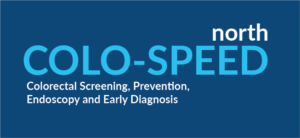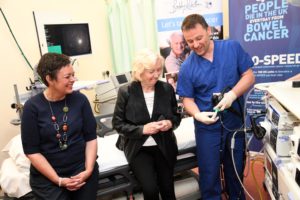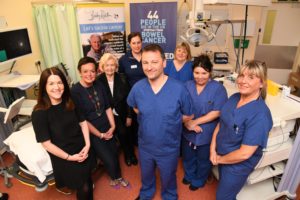COLO-SPEED – GROUND-BREAKING BOWEL CANCER RESEARCH
A ground-breaking £985,000 cancer research and treatment project, funded by our Foundation and announced today (11 June), aims to reverse the North East and Cumbria’s high incidence and low survival rates of bowel cancer (also called colorectal cancer).
The Colorectal Cancer Screening Prevention Endoscopy and Early Diagnosis project, or COLO-SPEED, will see 17 regional NHS endoscopy units – from Whitehaven to Sunderland, and Northallerton to Cramlington (full list below) – recruiting up to 5,000 patients a year to help speed up research into the disease.
Professor Colin Rees, Professor of Gastroenterology at Newcastle University and South Tyneside and Sunderland NHS Foundation Trust, is one of Europe’s leading experts in endoscopy (the procedure used to diagnose most forms of bowel cancer) and is passionate about improving bowel cancer outcomes.
Professor Rees says: “We want to see research that used to take years happening within months. And to make sure it becomes of benefit to patients quickly.
“Essentially, COLO-SPEED will provide the structure to deliver new research projects far faster than we currently can. And we’ll do that with help from clinicians in regional endoscopy units and support from patients across the region.
 “To use a football analogy, if you had to build the stadium and source the players and supporters every time you played a match, it would be a very slow process. Thanks to this funding from the Sir Bobby Robson Foundation, COLO-SPEED will ensure everything we need is already in place when we have to find the answer to a question through targeted research.”
“To use a football analogy, if you had to build the stadium and source the players and supporters every time you played a match, it would be a very slow process. Thanks to this funding from the Sir Bobby Robson Foundation, COLO-SPEED will ensure everything we need is already in place when we have to find the answer to a question through targeted research.”
40,000 people are diagnosed with bowel cancer in the UK each year – and 16,000 people die from the disease (44 every day).
Rates vary substantially across England and are very high in the North East – men in this region have the highest bowel cancer incidence rates in England with women also in the upper half of incidence rates.
Survival rates for men and women in the North East are also amongst the lowest in the country and the survival rates in the UK are lower than in many other European countries.
Professor Rees adds: “Most bowel cancer cases and deaths are preventable through a combination of making lifestyle changes, finding and removing polyps (warty like growths within the bowel that may become cancerous) before they become cancerous, or by taking drugs like aspirin to help prevent polyps forming.
 “Bowel cancer is a disease where we know we can make a real difference through targeted research and COLO-SPEED is something we believe will be a world-leading model for prevention and early diagnosis research. We’re very grateful to everyone who has donated to the Sir Bobby Robson Foundation to help make it a reality.
“Bowel cancer is a disease where we know we can make a real difference through targeted research and COLO-SPEED is something we believe will be a world-leading model for prevention and early diagnosis research. We’re very grateful to everyone who has donated to the Sir Bobby Robson Foundation to help make it a reality.
“It is time that we used the research strength of the North East and collaboration with patients to make a significant impact upon bowel cancer and stop as many people as we can suffering from and dying from this disease.”
As with all projects funded through our Foundation, patients are at the heart of COLO-SPEED. Patients attending one of the 18 participating regional endoscopy centres, where polyps and cancer are diagnosed, will be given the opportunity to become a potential research participant.
Another key component of COLO-SPEED will be the development of a novel digital platform led by Newcastle University’s Open Lab, providing a resource and tools to support the project that will be used to collect data, feedback results and deliver ongoing patients and public engagement.
Paula Fowler, aged 50, from East Boldon, was diagnosed with bowel cancer in October 2017.
She is a Customer Service Manager, married to Jeff, with two children, Beth and Sam.
Paula says: “It’s really, really important that we get bowel cancer ‘out there.’ And what I mean by that is it’s important that people understand what’s happening in their own body, not to feel embarrassed and to bring to their doctor’s attention any changes in bowel habits. Any bodily changes really.
“I found out because I was feeling tired and had indigestion with a swelling in my abdomen. It was probably only five days from having my blood test and scans that I was told I had stage 4 bowel cancer.
“One day I was going to work and a few days later my whole life changed. With a lot of support, I’ve managed to remain positive. Obviously, there are dark days now and again but I’m still here, again, thanks to a lot of support.
“To begin with surgery wasn’t an option but I had rounds of chemotherapy and radiation treatment and responded well, and six weeks ago I had part of my liver and the bowel tumours were removed. So, I’m not out of the woods but it’s given me a much better prognosis.
“I’m passionate about spreading awareness about bowel cancer. Talking about bodily fluids, changes in your poo or whatever may not feel great but it’s so, so important.”
Lady Elsie says: “Bob’s aim when he began our Foundation was to fund research that he could see would make a difference, not just here in the North East, but around the world.
“All of our trustees were impressed by the potential of COLO-SPEED to do just that. As ever, it will need to be a great team effort to succeed and, through Professor Rees, we know there’s a wonderful enthusiasm from across the whole region to get involved in this project.”
Regional endoscopy units currently participating in COLO-SPEED:
• South Tyneside
• Sunderland
• North Tees
• North Tyneside
• Carlisle
• Whitehaven
• Penrith
• Northallerton
• Darlington
• Middlesbrough
• Hartlepool
• Gateshead
• Newcastle
• Hexham
• Cramlington




